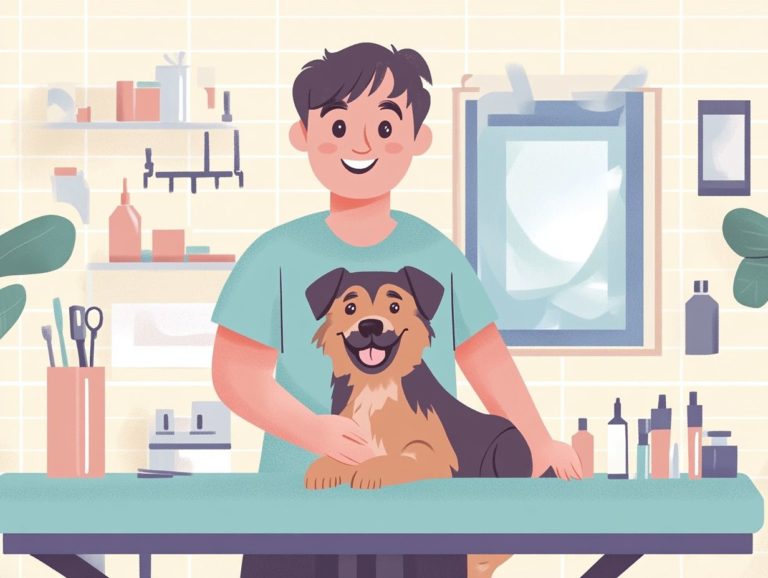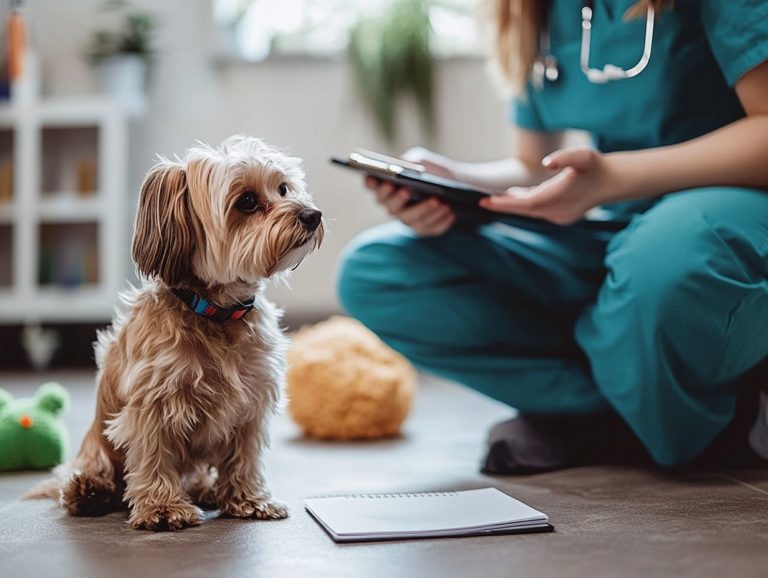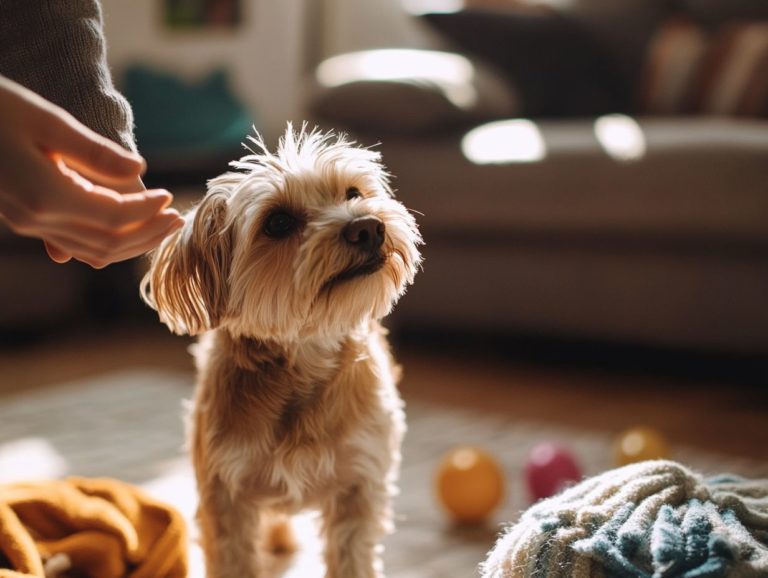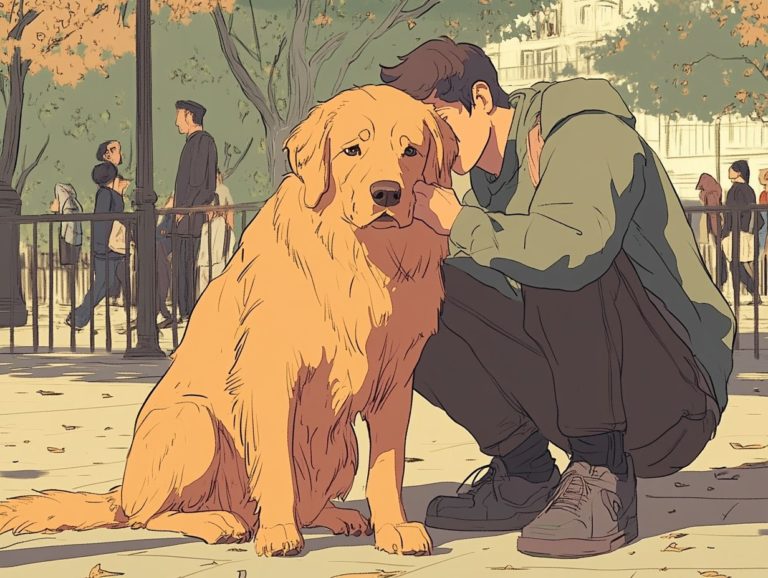Can I Use Essential Oils for Pet Anxiety?
Pets, much like you, can experience anxiety triggered by various factors whether it s loud noises, shifts in their daily routine, or separation from you.
Grasping the causes and symptoms of anxiety in pets is vital for their overall well-being. This article delves into the use of essential oils as a natural remedy, highlighting which types can be beneficial, how to apply them safely, and alternative techniques to soothe anxious companions.
Discover how to cultivate a tranquil environment for your furry friends, ultimately enhancing their quality of life.
Contents
- Key Takeaways:
- Anxiety in Pets: Causes and Symptoms
- Essential Oils for Pet Anxiety
- How to Use Essential Oils for Pet Anxiety
- Safety Considerations
- Other Natural Remedies for Pet Anxiety
- Frequently Asked Questions
- Can I Use Essential Oils for Pet Anxiety?
- Which essential oils are safe to use for pet anxiety?
- How do I use essential oils for my pet’s anxiety?
- Are there any risks to using essential oils for pet anxiety?
- How often should I use essential oils for my pet’s anxiety, especially during high-stress holidays?
- Can essential oils, such as Young Living products, be used with other anxiety treatments for pets?
Key Takeaways:
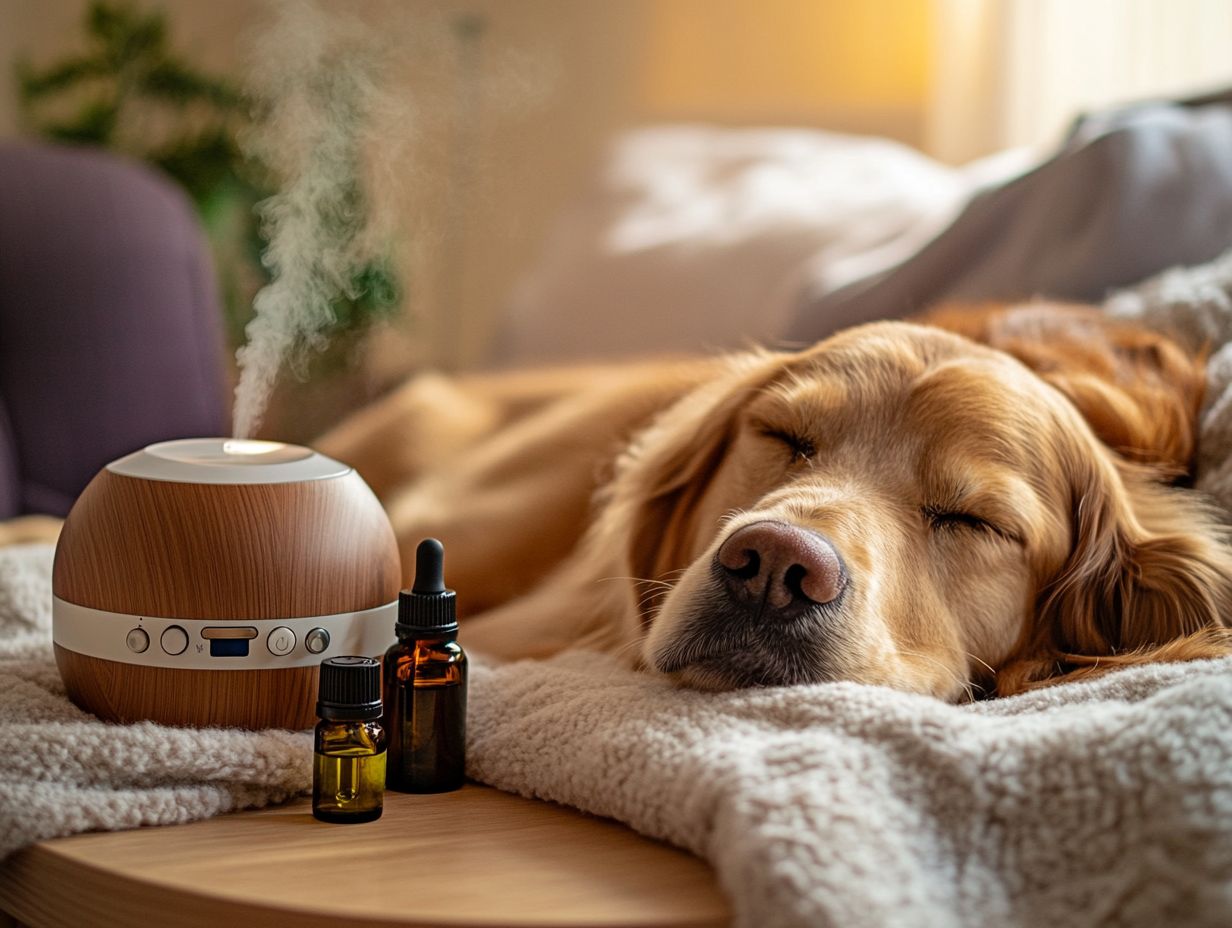
- Understand your pet s anxiety before using essential oils.
- Different types of essential oils have specific benefits for pet anxiety, such as lavender for calming and chamomile for relaxation.
- When using essential oils for pets, proper application and dosage are crucial to ensure safety and effectiveness.
Anxiety in Pets: Causes and Symptoms
Anxiety in pets, particularly in dogs, can stem from a variety of triggers, including separation from you, loud noises during festive occasions like New Year s Eve or the 4th of July, and shifts in their environment.
It s crucial for you to recognize the symptoms barking, pacing, or destructive behavior so you can effectively support the health and well-being of your canine companion. By understanding these causes and recognizing the signs, you can intervene promptly, providing the necessary support for your pet’s anxiety.
This proactive approach ultimately enhances the bond you share, creating a deeper connection between you and your furry friend.
Understanding the Root of the Problem
Understanding the root of anxiety in dogs is essential to provide helpful ways to support your pet. Various emotional and environmental factors contribute to their stress levels, and recognizing these can make a world of difference.
You might be surprised to learn that seemingly minor changes, like a shift in routine or the arrival of a new household member, can trigger significant anxiety in your furry friend. Dogs are incredibly sensitive to their surroundings; loud noises, unfamiliar scents, or even the absence of a primary caregiver can elevate their stress levels.
Separation anxiety is particularly common in dogs who have formed strong bonds with their owners, leading to distress when they find themselves alone. Changes in daily life, such as moving to a new home or altering walking schedules, can heighten anxiety for these sensitive pups.
By understanding these stressors, you can promote emotional well-being and help your canine companions thrive in a more peaceful environment.
Essential Oils for Pet Anxiety
Let’s explore how essential oils can be a game-changer for your pet’s anxiety! Essential oils have become an effective solution for addressing pet anxiety, offering calming effects that can effectively soothe dogs facing stress during occasions like Halloween or New Year’s Eve celebrations. For additional insights, check out what natural remedies can help with pet anxiety.
Types of Essential Oils and Their Benefits
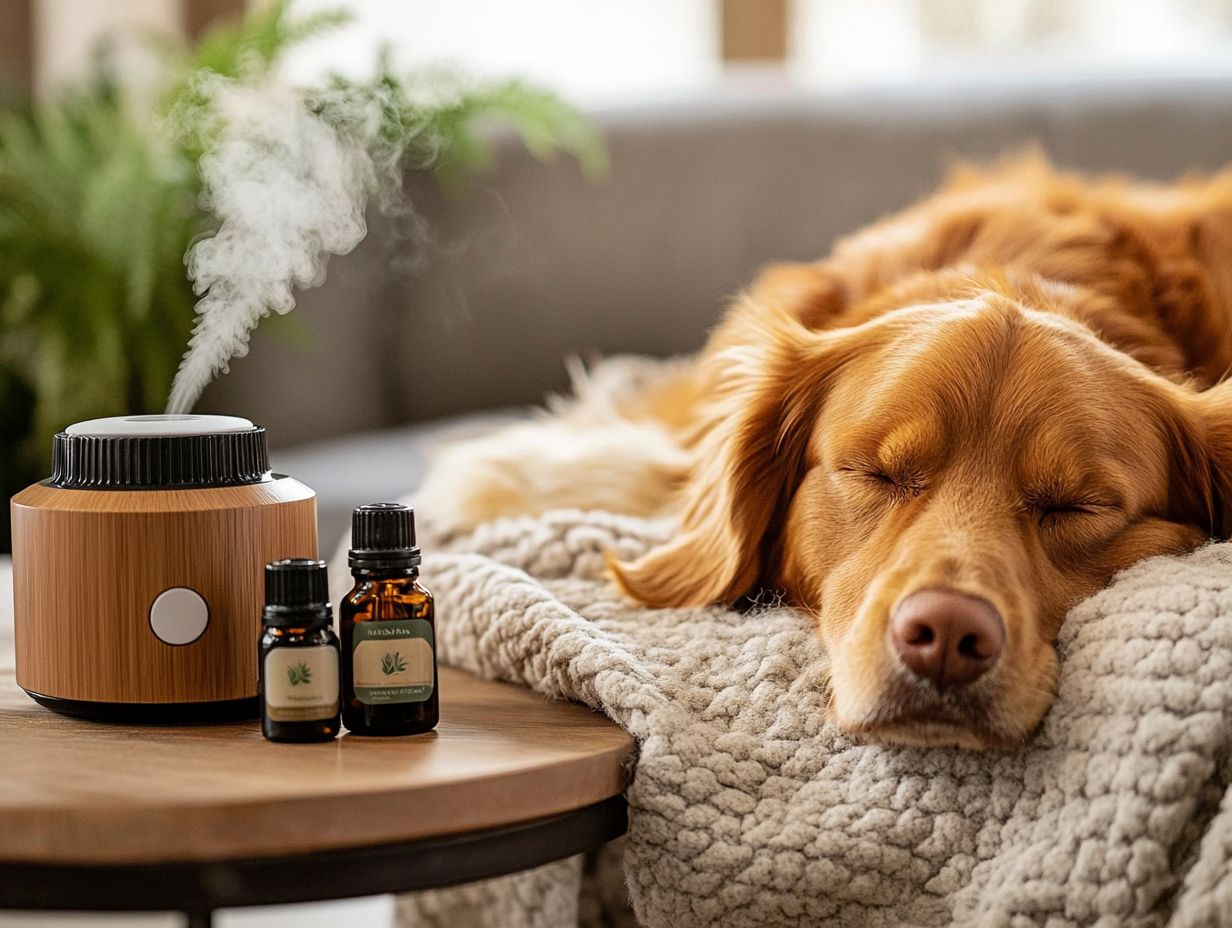
There are several essential oils that can work wonders for calming your dog, including lavender, chamomile, valerian, ginger, and vanilla. Additionally, therapy animals can help with pet anxiety, and each of these oils has unique properties that promote relaxation and help alleviate anxiety.
These oils can be especially helpful during stressful situations, like holiday gatherings or vet visits, when your dog’s anxiety levels might spike. For instance, take lavender oil; it not only soothes frayed nerves but also helps slow down your pup’s heart rate, creating a serene atmosphere. If you’re wondering, can pet anxiety be managed at home?
Chamomile is another gentle choice, renowned for its anti-anxiety effects perfect for those chaotic moments when new visitors stir up a bit of excitement.
Then there s valerian, often dubbed nature’s sedative, which can be quite effective during fear-inducing situations like storms or loud noises. Don t forget about ginger and vanilla; they bring their own calming qualities, helping to reduce nausea and foster an overall sense of peace.
Together, these oils contribute to a more tranquil environment for your furry friend.
How to Use Essential Oils for Pet Anxiety
Be careful when using essential oils for pet anxiety. You must consider application and dosage. Your pet’s safety and comfort are your top priority, so it is vital to understand how to use essential oils for anxious pets, which utilizes scents to help improve mood.
Proper Application and Dosage
Proper application and dosage of essential oils for dogs are essential for safety and maximizing the calming effects. If you’re concerned about your dog’s anxiety, you might wonder, can pet anxiety be cured? Incorrect usage can lead to adverse reactions or increased anxiety.
To achieve the best results, adhere to specific dilution ratios. It s generally recommended to blend 1-2 drops of essential oil with 1 tablespoon of a carrier oil, such as coconut or olive oil.
Before applying these oils, test a small amount on an inconspicuous patch of skin to check for any sensitivity or irritation.
Diffusing essential oils is a popular method. Ensure the area is well-ventilated, and your pet can leave if they feel uncomfortable. Continuously monitor for signs of unease or adverse reactions to safeguard your dog’s health while enhancing their overall well-being.
Safety Considerations
When turning to essential oils as a remedy for your dog’s anxiety, prioritize safety precautions and be aware of potential risks. For more information on whether medication might be needed, check out if medication is necessary for pet anxiety. This careful approach helps avoid any adverse effects that could arise.
Potential Risks and Precautions
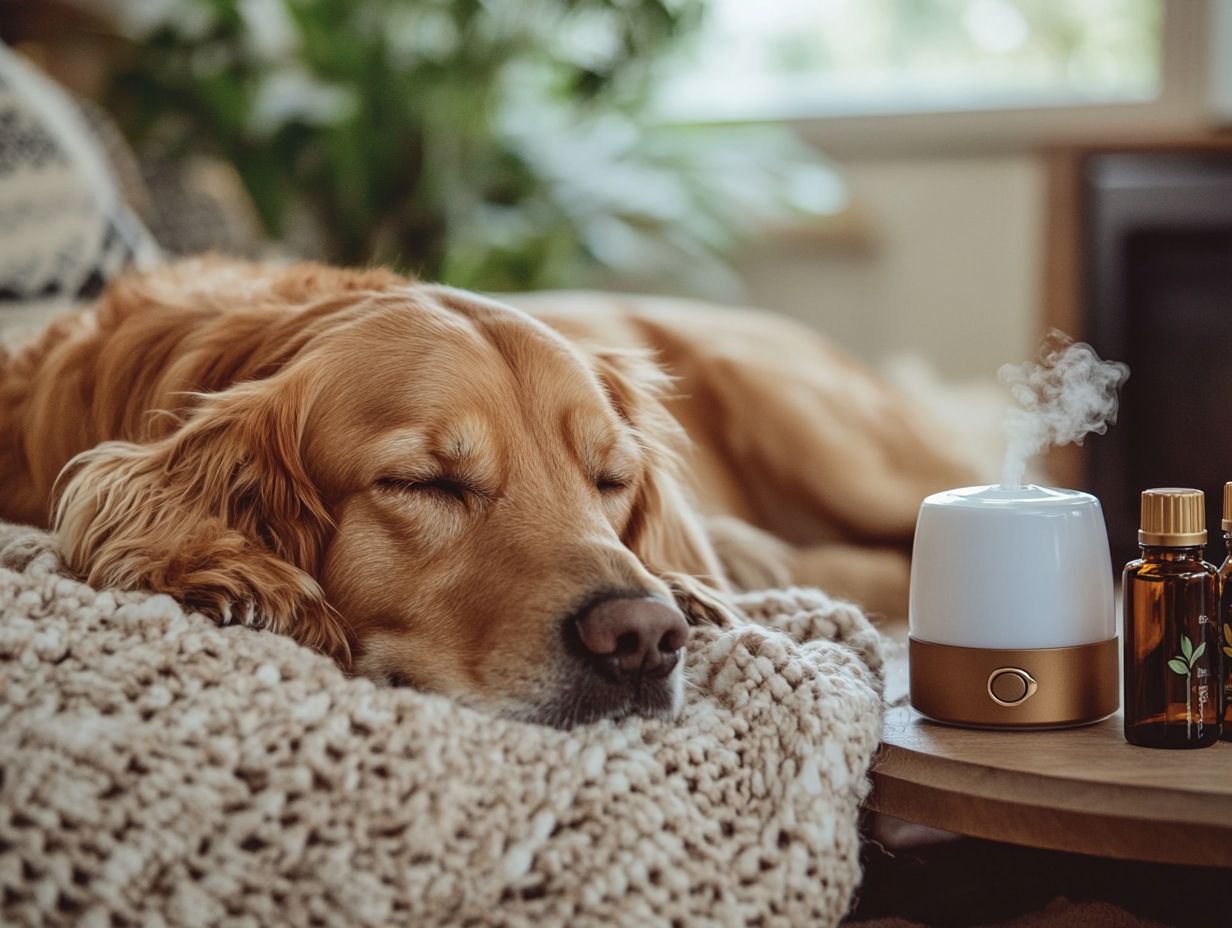
Understanding the potential risks and precautions associated with using essential oils for dogs is crucial for you as a pet parent. This knowledge empowers you to ensure safe practices while addressing your dog’s anxiety effectively, including exploring whether pet anxiety can be treated effectively.
Many essential oils can be toxic to canines, potentially leading to symptoms like nausea or vomiting, depending on the type and quantity used. For instance, oils such as tea tree, eucalyptus, and peppermint can pose significant risks.
To mitigate these dangers, consult your veterinarian before introducing any new oils into your home. Using a diffuser in a well-ventilated area, keeping oils out of your pet’s reach, and monitoring their behavior can further promote a safe environment.
By educating yourself about safe practices, you can confidently incorporate aromatherapy into your routine while ensuring your furry companion stays safe and sound.
Other Natural Remedies for Pet Anxiety
In addition to essential oils, you have a wealth of natural remedies and alternative methods to help ease anxiety in dogs. This offers you a diverse array of options to soothe your beloved furry companion.
Alternative Methods for Calming Pets
Alternative methods for calming your pets include a range of natural solutions, such as interactive toys, calming music, and behavioral training. These strategies can effectively reduce anxiety and stress in dogs, giving you peace of mind.
Not only do these approaches provide immediate comfort, but they also cultivate long-term emotional stability. For instance, interactive toys engage your dog’s mind, distracting them from stressful triggers and promoting relaxation.
Calming music, specifically composed to soothe anxious animals, works wonders by lowering heart rates and easing tension with gentle melodies.
Meanwhile, behavioral training equips your dog with coping mechanisms to navigate anxiety-inducing situations, boosting their confidence and composure. Together, these methods create a holistic strategy for you as a pet owner, providing effective anxiety relief and fostering a serene environment that nurtures your pet’s overall well-being.
Frequently Asked Questions
Can I Use Essential Oils for Pet Anxiety?
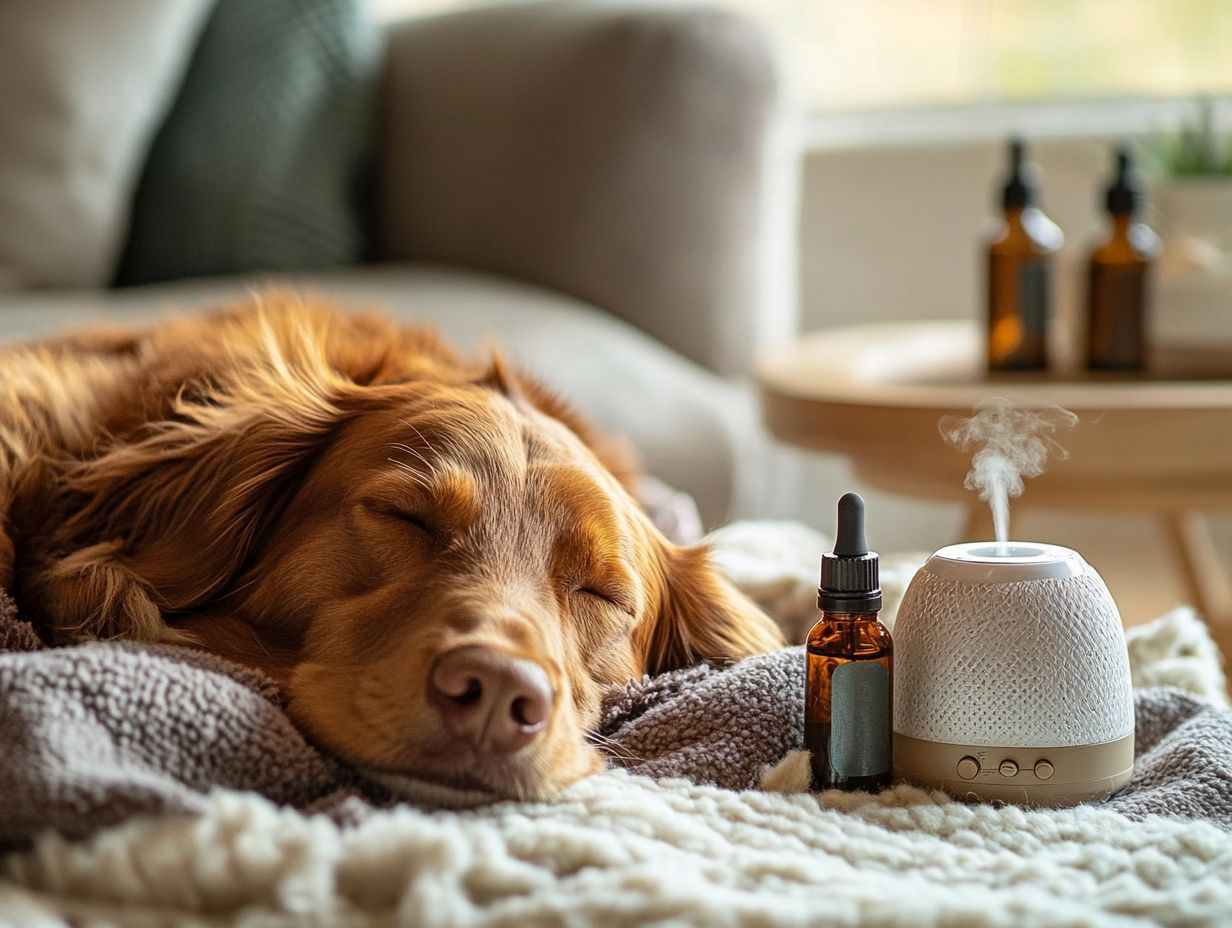
Yes! Essential oils can help your pet feel calmer, but always use them safely. Additionally, if you’re considering alternatives like CBD, it’s important to check if it’s safe to use CBD for pet anxiety and consult with a veterinarian before use.
Don’t wait! Explore more about pet care and share your experiences with essential oils.
Which essential oils are safe to use for pet anxiety?
Safe options for pet anxiety include lavender, chamomile, and valerian.
Choose high-quality, pure oils and always dilute them properly before use.
How do I use essential oils for my pet’s anxiety?
Use essential oils in various ways, including diffusion, topical application, or adding them to your pet’s bedding or collar.
Start with a small amount and closely monitor your pet’s reaction.
Are there any risks to using essential oils for pet anxiety?
Essential oils can help with pet anxiety, but they can also pose risks.
Some oils may be toxic, and others could cause skin irritation or breathing issues. Always consult a veterinarian before use.
How often should I use essential oils for my pet’s anxiety, especially during high-stress holidays?
The frequency of use varies based on your pet’s needs and reactions.
Start with small amounts and gradually increase as necessary. A veterinarian can offer specific advice.
Can essential oils, such as Young Living products, be used with other anxiety treatments for pets?
Yes, essential oils can work alongside other treatments for pet anxiety.
Always consult a veterinarian first. Do not replace prescribed medications with essential oils without professional advice.


